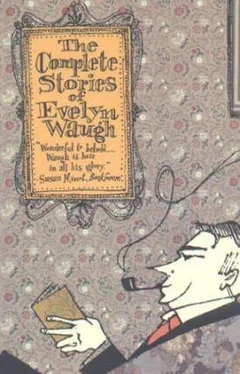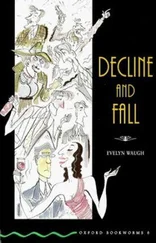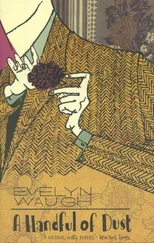Evelyn Waugh - The Complete Stories Of Evelyn Waugh
Здесь есть возможность читать онлайн «Evelyn Waugh - The Complete Stories Of Evelyn Waugh» весь текст электронной книги совершенно бесплатно (целиком полную версию без сокращений). В некоторых случаях можно слушать аудио, скачать через торрент в формате fb2 и присутствует краткое содержание. Год выпуска: 1998, ISBN: 1998, Жанр: Классическая проза, на английском языке. Описание произведения, (предисловие) а так же отзывы посетителей доступны на портале библиотеки ЛибКат.
- Название:The Complete Stories Of Evelyn Waugh
- Автор:
- Жанр:
- Год:1998
- ISBN:0-316-92546-2
- Рейтинг книги:3 / 5. Голосов: 1
-
Избранное:Добавить в избранное
- Отзывы:
-
Ваша оценка:
- 60
- 1
- 2
- 3
- 4
- 5
The Complete Stories Of Evelyn Waugh: краткое содержание, описание и аннотация
Предлагаем к чтению аннотацию, описание, краткое содержание или предисловие (зависит от того, что написал сам автор книги «The Complete Stories Of Evelyn Waugh»). Если вы не нашли необходимую информацию о книге — напишите в комментариях, мы постараемся отыскать её.
The Complete Stories Of Evelyn Waugh — читать онлайн бесплатно полную книгу (весь текст) целиком
Ниже представлен текст книги, разбитый по страницам. Система сохранения места последней прочитанной страницы, позволяет с удобством читать онлайн бесплатно книгу «The Complete Stories Of Evelyn Waugh», без необходимости каждый раз заново искать на чём Вы остановились. Поставьте закладку, и сможете в любой момент перейти на страницу, на которой закончили чтение.
Интервал:
Закладка:
Peter turned down the corner of his page—a pernicious habit even in a wartime “Outlines of Economics” of which he could never cure himself—and got up.
“Come across to hall, you silly old ass, and tell me the latest bulletins from Sackville Street.”
“Nothing doing,” said Bellinger with the self righteous gloom of one whose religion has been insulted and pulled at the points of his waistcoat, “nothing doing at all. It’s the curse of this infernal war. While all the best people are in uniform they don’t pay any attention to civilian fashions. Thank the Lord I shall be in khaki in a couple of months.”
They linked up and walked down to hall, Bellinger earnestly enlarging upon the advantages of the R.A.F. over the ordinary uniform.
When they arrived at the “pits-table,” where people with studies sat, a heated discussion was going on. The head, Peter gathered, had proposed to the Games Committee the night before that none of the house cups should be competed for until after the war and that the time saved should be devoted to more parades and longer digging upon the house potatoe plots. Cook, the captain of Lane’s, had apparently been the only one with the courage to hold out against him. Lane’s were certain to get the open football and stood a good chance for the Five Mile.
Beaton, a small science specialist, was voluble in the head’s defence.
“After all,” he was saying, “what effects has the war had on us here? We’ve had a little less food and coal, people have been leaving a little earlier, the young masters have gone and these antiquated old fools like Boyle have taken their places, parades have become a bit longer, but is this enough? Has anything been done to make us realize that we are in the middle of the biggest war in history?”
“Everything has been done,” said Peter, “to make school life excessively unpleasant—after you with the bread, please Travers—what little of the old life does remain, is what keeps it just tolerable. Good God, isn’t it bad enough for you. I pity the men who’ve come during the last year and know only this side of Selchurch. I hate school, now, and shall be only too glad to get away; why utterly spoil it for the ‘underschools’?”
“Yes,” said Travers a large, sad “historian” on the other side of the table, “You seem to be one of the maniacs who believe in making themselves wretched because other people are. It’s only by the misery of three quarters, that life can be even tolerable for a quarter of society. It’s unjust but it’s better than the whole show being miserable. It’s a fundamental principle of political science”—any particularly sweeping cynicism was a “fundamental principle” with Travers.
“My pater had that craze badly in 1914,” said Garth, a pleasant, spotty youth, next to Peter, “he dug up the tennis court to grow vegetables when there was plenty of waste ground behind the stable yard.”
“And the mater makes me wear old clothes,” said Bellinger, “because she thinks it looks bad to wear new ones in war time.”
“Everyone is quite imbecile about the war”—Travers loved dismissing subjects—“they don’t realize that it is a natural function of development. It’s a fundamental principle that society can only remain normal if it is decimated at regular periods.”
The “paper boy” came to the table. Every day it was the duty of one of the fags to fetch the house papers from the porter’s lodge, as soon as he came out of early school, and bring them up to hall. They were supposed to go to the people who had bought them at the “paper auction” at the beginning of term, but in practice they went first to the high table where the prefects sat with the housemaster; when they had made their choice, he took them to the “pits-table” and distributed what were left as he liked.
“Times, please” said Peter over his shoulder.
“I’m sorry, Audley, that’s gone.”
“All right, Morning Post. Thanks.”
He spread it out over the table and glanced down the columns. It was full of the usual war news (Peter wondered vaguely what they managed to put in the papers in peace time); there were rumours of preparations for a big German offensive, factious political questions in the house, pages of minor engagements in the East. He folded it and passed it on to Bellinger.
III
It was a gloomy morning; gloomy even for the Easter term 1918. For half an hour after breakfast he sat in his study cleaning his uniform; in chapel he could smell the cleaning stuff up his nails. After chapel he had to go in for a double period of European History. He went into school profoundly depressed.
The “historians” were now taken by one Boyle. He had been, until the outbreak of war, the headmaster of a prosperous preparitory school on the East coast and had lived a life of lucrative dignity, making himself agreeable to distinguished parents and employing a large and competent staff to do the teaching. For two years he had kept doggedly on, feeling that it would be a surrender to the barbarian enemy if he left, but the numbers steadily sank, until one night a bomb was actually dropped onto the gymnasium breaking every frame of glass in the house. Then he realized that he must give it up, “St. Pendred’s” was commandeered to house a garrison staff, and Mr. Boyle set about finding other employment. The head forced to choose between Mr. Boyle and a mistress, to his eternal discredit chose Mr. Boyle and in less than a year the Senior History Specialist Set had sunk from the intellectual mekka of the school to the haven which sheltered those who considered that the work they had had to do to pass the School Certificate absolved them from any further exertions, at any rate, while they were at Selchurch. Not that he was ragged—that would have been beneath the dignity of a Sixth Form set—They merely sat through his hours in complete apathy. His predecessor had been a young man fresh from Cambridge and had made his history extremely entertaining, they had held debates, read each other papers and discussed current politics, but now there were no Varsity scholarships, the battle clouds of France shut out all but the immediate future and no one had any particular motive for, or interest in, working. Mr. Boyle certainly had not and Youth, far from being the time of burning quests and wild, gloriously vain ideals beloved of the minor poets, is essentially one of languor and repose. Every hour he dictated notes, from a large leather bound note book, which most people took; every week he set an essay which several people wrote; every month he gave out a syllabus of books for out of school study, which nobody read. He asked for little and was content with far less but the Senior History Specialist set often seemed unsatisfactory even to Mr. Boyle.
He came into the class room smiling a dignified welcome all round, laid his note book on one side of the high oak desk, his mortar board on the other, and sat down smoothing out his gown.
“Good morning, gentlemen,” he began in his usual formula, “What are we doing this morning? European history, isn’t it Travers? Thank you. Ah yes, well I don’t think we can do better than go on with our notes for a little. Now let me see where was it we had got to. Alberoni? Yes I see I have the place marked. The last thing I gave you was ‘willing to cede Sardinia to secure her nephew’s succession to the Duchy of Parma’ wasn’t it? Well then, head this ‘D. Alberoni’s third coalition.’” For two hours he dictated an essay on XVIIth diplomacy.
Peter had reduced the taking of notes to an entirely subconscious exercise. He could now sit schooled by long practice, with his mind completely blank or filled with other things while his pen wrote out pages of notes industriously and quite correctly. Sometimes he would be woken from his reverie by a pause over some proper name, but often on looking them through he would find names which he had no recollection of having heard before. He sat writing out,
Читать дальшеИнтервал:
Закладка:
Похожие книги на «The Complete Stories Of Evelyn Waugh»
Представляем Вашему вниманию похожие книги на «The Complete Stories Of Evelyn Waugh» списком для выбора. Мы отобрали схожую по названию и смыслу литературу в надежде предоставить читателям больше вариантов отыскать новые, интересные, ещё непрочитанные произведения.
Обсуждение, отзывы о книге «The Complete Stories Of Evelyn Waugh» и просто собственные мнения читателей. Оставьте ваши комментарии, напишите, что Вы думаете о произведении, его смысле или главных героях. Укажите что конкретно понравилось, а что нет, и почему Вы так считаете.












